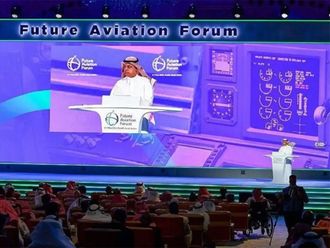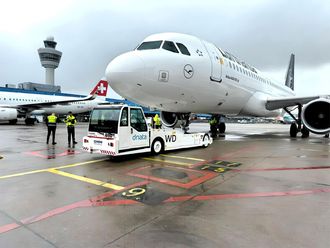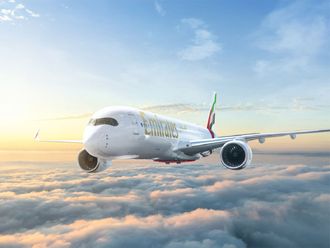Abu Dhabi: Reacting strongly to the subsidy and unfair allegations levelled by big three airlines of the US against Gulf carriers, Emirates said it has helped create thousands of jobs in the US and contributed in adding economic value to the airports where it is operating.
Emirates flies 84 flights each week from nine USA gateways including Boston, Chicago, Dallas/Fort Worth, Houston, Los Angeles, New York, San Francisco, Seattle and Washington DC.
The estimated annual economic value of Emirates services to these airports and their surrounding regions is $2.9 billion, Emirates said in a statement on Tuesday.
In addition, via interline arrangements, Emirates said that it has provided over 775,000 feed passengers to US legacy carriers, producing $133 million in financial benefits to them over the past five years.
Releasing its point-by-point, fact-based response to the allegations made by three US-based airlines — Delta, United and American Airlines — Emirates on Tuesday said restricting competition would hurt consumers, communities and the national economy.
“The Big 3 [US legacy carriers] are earning record profits, while seemingly content to remain on the lower ranks of global customer satisfaction surveys. They claim to have lost traffic to competition but in fact on every route that Emirates has established to the US, overall traffic has grown significantly after Emirates’ entry,” Emirates stated.
The Dubai-based carrier dismissed allegations that hundreds of jobs are being lost to foreign carriers. Referring to aviation experts in Campbell Hill Aviation group, who analysed the US job effects of Emirates flights to the US, it said Emirates supported nearly 4,000 jobs per daily round trip service. In Austria, it supported 3,300 jobs and in Germany 2,400 jobs.
According to Emirates, there is a tremendous groundswell of support from across the spectrum of US stakeholders who believe the US national interest in best served by maintain open skies policy and not selectively unravelling it.
These stakeholders, Emirates said, are low-cost carriers, non-legacy carrier hub cities and airports, air cargo carriers, leading hospitality and tourism businesses among others are a far better barometer than the self-interested legacy carriers. “These stakeholders believe the national interest should be the Obama Administration’s North Star in this matter, and not the parochial interest of Delta, United and American in constraining competition for their benefit alone,” Emirates said.
Sir Tim Clark, President of Emirates airline, said that the Big 3’s white paper is littered with self-serving rhetoric about ‘fair trade’, ‘level playing field’, and ‘saving jobs’, but their mess of legal distortions and factual errors falls apart at the slightest scrutiny. “The allegations about Emirates receiving subsidies or competing unfairly are false. The Big three are far from being ‘harmed’ financially by Emirates’ operations, and they are not even operating in the same markets that we are,” he said.
The airline rejected the allegations that is has received over $6 billion in subsidies, including fuel hedging subsidies, purchasing goods and services from related third parties at below market terms, disproportionately benefiting from airport infrastructure and user fee at Dubai International Airport and having artificial cost advantage through the structure of the UAE’s labour law.
“The subsidy allegations put forward by the Big 3 are patently false. We have been profitable for 27 years straight, and unlike our accusers, we have never depended on government bailouts or protection from competition.”
“Dubai has no oil reserves to speak of, and therefore it embarked on a well-documented strategy to diversify its economy with air transport as a key enabler.”
Andrew Charlton, managing director of Aviation Advocacy based in Switzerland, told Gulf News by phone that the allegations made by US carriers are baseless. “US airlines for many years benefited from open competition. The moment there is sniff of a gunfire, they are hiding behind the wall of protectionism. It is incredible. The US airlines are making the allegations to protect their market share.” He added that there is a need to have a normal regulatory framework in aviation instead of an old-fashioned regulatory framework which is extremely restrictive. “The 70-year old framework is not helping the aviation industry. It should be reviewed and be made normal to fit in today’s business. We need strong rules on safety,” Charlton said.
Fuel hedging allegation is false:
The US carriers have misinterpreted Emirates’ financial reporting of its fuel hedging activity, mischaracterised the facts of the fuel hedging contracts,
and misunderstood the terms of Emirates’ 2009 transaction with its parent company, Investment Corporation of Dubai (ICD), Emirates said in its 350-page report. “In brief, the Government of Dubai did not provide a subsidy to Emirates either directly or through ICD. After the hedging contracts were assumed by ICD, Emirates voluntarily declared specific dividend amounts to ICD, matching the amount of all the losses imposed by the hedging contracts at maturity. These dividends were paid by Emirates either by making payments on behalf of ICD or directly to ICD. Neither the Dubai Government nor ICD absorbed any hedging losses. To the contrary, when the transactions were completed, ICD made a profit, receiving net fuel hedging gains in excess of $100 million, gains that would have accrued to Emirates but for the novation,” it stated.











